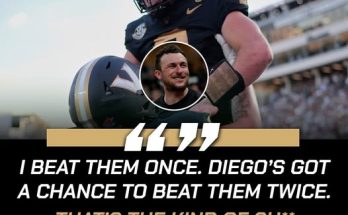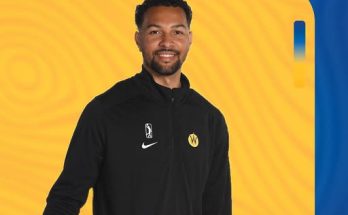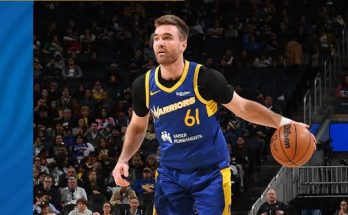The Oklahoma City Thunder’s rise to prominence in the 2023-24 NBA season was a story of youth, resilience, and unfulfilled dreams finally realized—just not by the ones who laid the foundation. Watching from afar, Serge Ibaka, a key figure in the Thunder’s golden era, couldn’t help but feel a mix of pride and wistfulness as Shai Gilgeous-Alexander, Jalen Williams, and Chet Holmgren carried the franchise to heights he and his teammates once dreamed of. Ibaka’s Thunder came agonizingly close to glory but fell short, making this new generation’s success a bittersweet reminder of what could have been.
Ibaka was part of the legendary Thunder core that included Kevin Durant, Russell Westbrook, and James Harden—a trio destined for greatness but ultimately undone by circumstance, injury, and the ruthless nature of the NBA. The 2012 NBA Finals run, where they fell to the Miami Heat’s superteam, was supposed to be the beginning of a dynasty. Instead, it became a fleeting moment of brilliance before the team slowly unraveled. Harden was traded, Durant left in free agency, and Ibaka himself was eventually dealt to the Orlando Magic in 2016. The Thunder remained competitive, but the championship window had closed.
Fast forward to the present, and the Thunder are back in contention, this time led by a new wave of talent. Shai Gilgeous-Alexander, acquired in the Paul George trade, has blossomed into a bona fide superstar—a smooth, relentless scorer with the poise of a veteran. Jalen Williams, the versatile wing with a knack for clutch plays, and Chet Holmgren, the unicorn big man who alters games with his defense and shooting, have given the franchise a fresh identity. Together, they’ve restored the Thunder to relevance, playing with a chemistry and fearlessness reminiscent of Ibaka’s era.
For Ibaka, seeing this team succeed must evoke a flood of emotions. There’s undeniable joy in witnessing the franchise he once bled for rise again, especially with a group that embodies the same grit and camaraderie that defined his Thunder teams. But there’s also the unavoidable pang of nostalgia—the knowledge that he, Durant, Westbrook, and Harden were supposed to be the ones lifting banners. Injuries, bad breaks, and the sheer difficulty of sustaining success in the NBA robbed them of that chance.
Yet, Ibaka has never been one to dwell on regret. Throughout his career, he’s been the epitome of professionalism, adapting his game, embracing different roles, and ultimately winning a championship with the Toronto Raptors in 2019. That title was a validation of his perseverance, proof that even if his Thunder days ended without a ring, his legacy wasn’t defined by falling short. Now, as he watches Gilgeous-Alexander and company chase their own destiny, he can appreciate their journey without resentment.
What makes this Thunder team special is how they mirror the best qualities of Ibaka’s squads. They play with an unselfishness that was a hallmark of the Durant-Westbrook era. Gilgeous-Alexander, like Durant, is a scoring savant capable of taking over games. Williams brings the two-way intensity that Ibaka once provided, while Holmgren’s defensive presence and floor-spacing ability make him a modern version of the shot-blocking, mid-range-shooting Ibaka. The parallels are impossible to ignore.
But this new iteration also benefits from lessons learned from the past. The Thunder’s front office, once criticized for the Harden trade and Durant’s departure, has meticulously rebuilt through the draft and savvy acquisitions. They’ve avoided the pitfalls of rushing the process, allowing their young core to grow together rather than splurging on short-term fixes. The result is a team that feels sustainable, built for long-term success rather than a fleeting run.
Ibaka’s presence looms over this team in more ways than one. His defensive mentality—the relentless shot-blocking, the intimidating presence in the paint—is something Holmgren has clearly studied. The rookie’s ability to protect the rim while stretching the floor is a direct evolution of what Ibaka pioneered during his prime. Meanwhile, Gilgeous-Alexander’s leadership echoes Westbrook’s fiery passion, albeit with a calmer demeanor. The pieces are different, but the blueprint remains familiar.
There’s something poetic about Ibaka cheering for this team from afar. In many ways, he’s passing the torch, acknowledging that while his generation didn’t finish the job, they laid the groundwork for what’s happening now. The Thunder’s resurgence isn’t just a coincidence—it’s the culmination of a culture that was established over a decade ago, one that emphasized hard work, accountability, and team-first basketball. Ibaka, as much as anyone, helped instill those values.
As the playoffs unfold and the new Thunder core battles for supremacy, Ibaka will undoubtedly be watching closely. He knows better than anyone how difficult it is to reach the mountaintop, how fleeting opportunities can be. But he also knows that this team has what it takes to go all the way. Whether they do or not, their success is a testament to the enduring spirit of the franchise—a spirit that Ibaka helped define.
In the end, basketball is a game of cycles. Legends fade, new stars emerge, and franchises rebuild. But the connections between eras remain. Serge Ibaka’s Thunder may not have won it all, but their legacy lives on in Shai Gilgeous-Alexander, Jalen Williams, and Chet Holmgren. And for Ibaka, that’s worth celebrating.


